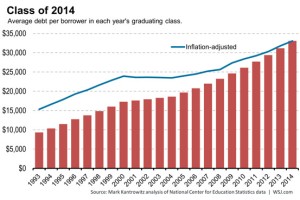Since World War I, the Western world has been dominated by a soft money economic order. The powers took to inflationary finance because it was necessary to fund the wars against one another.
Since World War II, direct interstate competition paused, and the current consensus is that it has stopped indefinitely.
My secret crackpot theory is that the mutually assured destruction is not actually a permanent condition, and that technological counter-measures to MIRV warheads have either already been developed or will be eventually developed, leading to a return to direct interstate warfare.
I base my crackpot, tough-to-prove theory on some of the comments by Samuel Cohen, inventor of the neutron bomb, on how he’d develop an alternative to the ‘Star Wars’ theory of anti ballistic missile defense. Essentially, rather than trying to zap ICBMs shortly after launch with a space-based weapon, you just launch a small neutron warhead at it, and use the air burst to neutralize anything coming at you. Such a technology would render the MAD theory, upon which all post-modern international relations is based, mostly moot. If you can neutralize a lot of warheads before they hit you, they have to use more conventional means to deter you instead.
So, anyway, to return to the ostensible topic of the post, the ability to use inflationary monetary policy to bleed your tax base beyond what would otherwise be the limit has stopped being a competitive advantage. It used to be, especially during a time in which all the European powers had turned to centralized political control, but is less so now that less centralized alternatives are emerging.
For a state competing with the existing superpowers to succeed, it would just need to develop a working anti-ballistic missile defense technology, either along the lines already theorized (which is technically not challenging compared to the dominant, politically correct theory), or along some other lines that have not yet been conceived of, like a Star Trek deflector shield. Whatever that is is what it would take to return the state system to a healthier era of interstate competition.
The debate between hard money and soft money systems is one of trade-offs. As a long time hard-money advocate, it’s difficult for me to deign to provide some positive arguments for a soft-money system.
The reasoning chain goes as follows:
The benefit of the soft-money system is that it allows the central state to mobilize for total war using mass armies. Just about all of the alternative economic arguments for soft money systems are facetious. There is no multiplier effect, ‘deflation’ is not damaging, and Keynes was just a glib pedophile with no special insights into economics.
Technology, even considering a possible neutralization of intercontinental nuclear weapons, has rendered mass armies obsolete.
Because the mass army is obsolete, the monetary system that enables it is also obsolete.
The soft money system, in which money & credit can be manufactured in infinite amounts for reasons of state, disrupts private property on a continuous basis. It re-orders society on the basis of proximity to soft-money banking systems, rather than on more durable measures of service to global markets.
This makes those people close to the source of authority very happy and very rich, and they are loath to give up their privileges. Those farther from that source of privilege are likely to want to kill or otherwise compete with the people close to the enormous soft-money nozzles, forever spewing new emissions of money and credit towards the primary dealers and their special friends.
Emerging hard money systems, whether gold or Bitcoin, represent existential threats to the soft money system, which has also lost its military advantage. The military advantage will continue to pass to decentralized professional military companies, as existed before the emergence of the state system in the 17th century. The loss of the military advantage tends to come before the loss of the monetary advantage, but does not become realized until major military defeat ensues.
The soft money system co-exists with monopoly systems on the legal use of force. Hard money systems coincide with breakdowns of those monopolies. It’s no coincidence that depreciation and Empire are so often coincident: when there is a sole, central government, even the wisest leaders have trouble maintaining a hard money regime.
On an economic basis, hard money systems out-compete the alternative, just because it suffers from fewer calculation problems. Because soft money systems rest on a monetary unit that is flexible, it disadvantages all economic entities that use it, because it introduces systematic inaccuracies into their accounting systems.
Soft money systems can compete on the military level, but only temporarily, based on a strong society created on a hard money basis. When the soft money system destroys the underlying society over time, the military advantage dissipates, because there is no more strong society upon which it can draw from.
Trustless monetary regimes are likely to dominate the international scene following the retraction of the American empire at the physical, moral, and economic levels. This will happen faster than most responsible people who want to present as reasonable are likely to want to represent. It’s the difference between Yahoo circa 1998 and Google circa 2005.
When a power has a crippling vulnerability, other powers notice that vulnerability, and exploit it at the opportune moment. The vulnerability does not need to be public knowledge for it to be exploited in a devastating way.
The future will be more competitive than the past, as a correction to the overly cooperative present.
